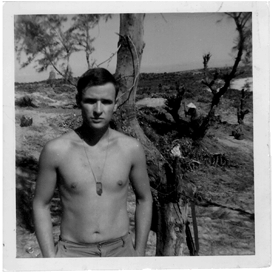Tim O’Brien Quotes Pt. 1: Teaching for Storycatchers

Tim O'Brien in Vietnam (Photo from stg.brown.edu)
I’ve been reading “The Things They Carried” by Tim O’Brien, and found this quote in the story “Notes:”
By telling stories, you objectify your own experience. You separate it from yourself. You pin down certain truths…
That sums up the value of the teaching work that I’ve been doing this fall for Storycatchers Theatre. The main part of the Storycatchers mission statement says:
Storycatchers prepares young people to make positive life choices through the process of writing, producing and performing original musical theatre inspired by personal stories.
I’m a teaching artist in Storycatchers programs in two Chicago-area juvenile detention centers. We get the students to tell and write stories from their lives, then we turn their stories into a musical play that they act in. Since I’m new, I’m yet to see the process from beginning to end, but so far I have coached writing, participated in a staged reading with one group, and am currently rehearsing my role as prison guard/”Arabian Nights” Sultan/kidnapper/gun dealer/sexually abusive stepfather for a musical production with another group.
I have minimal interest in theater, and acting is definitely not what I imagined myself doing with my MFA, but I’ve enjoyed it every day. A big part of the job is being a positive presence in the lives of the students, and being there to listen, talk and goof off a little. As you could imagine, these young inmates have not had easy lives. And, that’s where storytelling comes in. Telling a story helps you to move beyond an event, it gives you perspective. And if you have perspective on that event, you can see the things that may lead you to repeating it. Sharing a story also helps you to find similarities with other stories. A lot of the young inmates that I work with feel isolated by their problems, and sharing their stories helps them to build community.
In the Fiction Writing department, we talk a lot about opening permission for a writer to tell their story. We want writers to write about anything, and it often seems that the best stories touch on topics that the teller considers taboo.
Taboos = Drama = Good story.
I struggle with that in my own nonfiction writing. I’m working on a series of short stories about my experiences growing up in a biracial family, and it’s forced me to delve into my ideas about race, culture and myself. And it’s not easy – I’ve had to consider if attitudes I’d held for my entire life were incorrect. But I’ve noticed that the sections of writing where I feel like I might be oversharing are the sections that get the strongest responses from readers. So, I’m working on my own filter, and drawing inspiration from my Storycatchers students. If these teens are strong enough to share life-altering events, then I can write about getting picked on in high school for “talking white.”
WEEK LINKS:
Get to know the Fiction Writing program by reading its students’ work. Geoff Hyatt finished his MFA a couple years ago and has been teaching in the department ever since. Here’s his story “Red Eyes” in Knee-Jerk Magazine, a journal started by CCC Fiction Writing grads Casey Bye, Jon Fullmer and Steve Tartaglione. They publish a good amount of Columbia College folks, and are making headway in the indie lit world.

